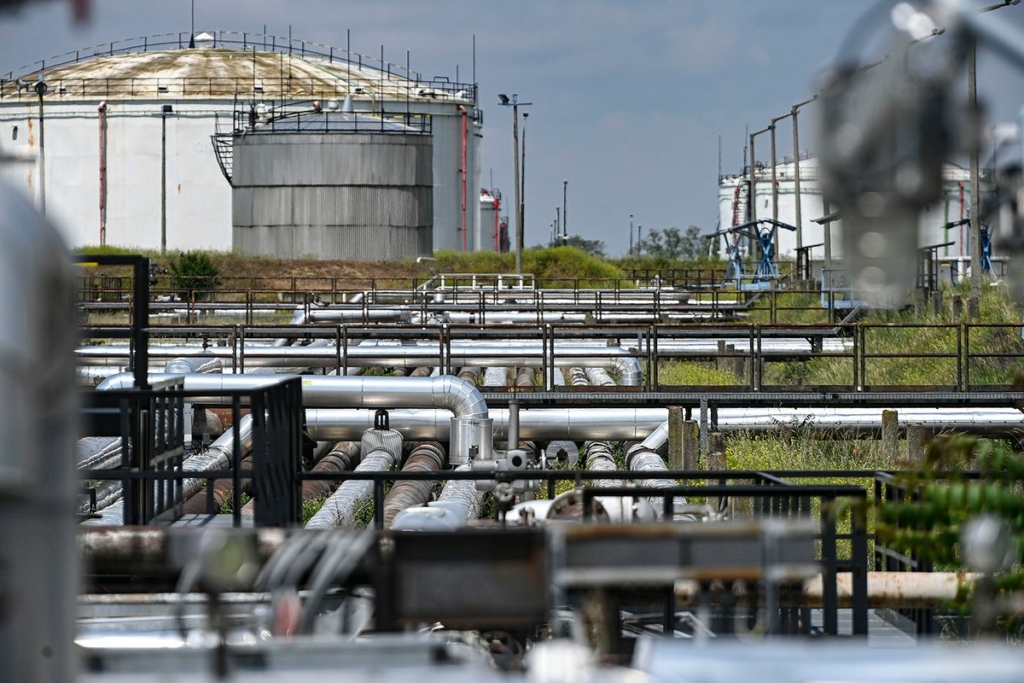Russian Lukoil oil may soon arrive in Hungary and Slovakia again. The new structure on the agenda does not contain legal risks but does contain transportation risks due to the war in Ukraine. As Sergiy Makogon, CEO of the Ukrainian oil transportation company Ukrtransnafta, points out: Russia will continue to have access to revenue from the export.
In a critical post on Facebook, Sergiy Makogon, CEO of the Ukrainian oil transportation company Ukrtransnafta, highlighted some interesting points regarding the upcoming agreement that would allow Russian Lukoil oil to return to Hungary and Slovakia. The new oil contract for Mol is nearing completion.

Ukraine would transmit Hungarian-owned oil
It is noteworthy that Ukraine imposed a ban on the transit of Lukoil oil on July 17th in order to deprive Russia, which is waging war against Ukraine, of the revenue from selling this oil. While two other Russian oil companies, which also export through the Friendship oil pipeline, compensated for the lost quantity, this situation is unacceptable for Hungary in the long term. A turnaround came when Gulyás Gergely, Minister leading the Prime Minster’s Office, announced on Thursday that Mol’s negotiations are nearing completion, allowing Lukoil oil to enter Hungary again. According to the planned contract, Mol would receive the oil at the Russian-Belarusian border, so Ukraine would transmit Hungarian-owned hydrocarbons instead of Russian ones. This structure increases the cost of the product by about one and a half dollars per barrel due to the increasing transportation and insurance expenses.
Sergiy Makogon believes that in principle, nothing would change, as Hungary and Slovakia would still receive Russian oil, and Russia would still have access to dollar revenue from this.
The CEO criticizes Hungary for stubbornly trying to maintain Russian oil supply through Ukraine. He points out that other European countries (except for Slovakia, Hungary, and the Czech Republic) have halted the import of Russian oil and petroleum products since June 2022 due to EU sanctions. However, at the same time, he notes that while European refineries that have renounced Russian oil are technically capable of processing raw oil from alternative sources in greatly differing proportions, this is not the case for the Danube Refinery (Dufi) of Mol. Dufi currently copes with about 30 percent alternative oil, and ongoing transformations are in progress to increase this ratio to potentially 100 percent. The transformation process, however, is time-consuming. (Ironically, countries that have renounced Russian oil purchase Russian oil through intermediaries.)
Hungary can buy oil from wherever it wants
The difficulties in Hungary are recognized by the EU authorities, as highlighted by Sergiy Makogon. As he writes, the European Commission has given these countries more time to develop alternative oil routes, such as through Croatia. He also acknowledges that Hungary has the sovereign right to buy oil wherever and from whomever it wants. However, as he states, Ukraine also has the sovereign right to prohibit the transport of hostile goods to reduce the war’s funding capacity. He also expresses his dismay that Ukrainian government officials are even discussing such proposals.
An annual contract for four million tons of Lukoil oil
Traditionally, Hungary and Slovakia’s oil supply from Russia is through the Druzhba pipeline. The pipeline starts in the Samara region, crosses the European part of Russia, then splits into two branches in Belarus. The northern branch leads to Germany via Poland, while the southern branch goes to Hungary, Slovakia, and the Czech Republic through Ukraine. Since 2023, no Russian oil has been reaching the European Union via the northern branch, but Kazakh oil is reaching Germany.
From December 2022, the EU has banned oil imports from Russia. The exemption for the three mentioned countries is valid until the end of 2025. In June 2023, it also prohibited the transport of Russian oil through the northern branch of the pipeline, but this has not been implemented.
The post also mentions that Mol signed a contract with Lukoil in 2019 to purchase four million tons of oil annually for Dufi and Slovnaft. The agreement expires at the end of 2024.
According to Vedomosti, citing the Ministry of Economic Development, in the first six months of 2024, Hungary received 2.4 million tons of Russian oil, while Slovakia received 1.6 million tons. Of these, Lukoil sent 883 thousand tons (37 percent) to Hungary and 718 thousand tons (45 percent) to Slovakia. Last year, Hungary imported 4.8 million tons of Russian oil, and Slovakia imported 4.6 million tons, with 1.5 million tons coming from Lukoil.
Oil may come, but some risks remain
Sergiy Makogon quotes Igor Yuskov, an expert from the Russian Financial University, who believes that it is not clear yet whether the new purchasing and transit structure negotiated by Mol will completely eliminate the risk of transit disruption. However, the planned solution – the temporary transfer of ownership of Russian oil – is authorized by the 1980 Vienna Convention on the international sales of goods, as clarified by AVG’s legal managing partner, Alexey Gavrysev. Since the purchasing, selling, and transfer of goods occur outside Ukraine, the Ukrainian side cannot interfere with this. According to the lawyer, Gulyas Gergely did not assume any legal risks, but rather expressed concern that the war endangers the safety of raw material transport. However, Igor Yuskov believes that the new construction will not significantly increase the cost of Russian oil imports to Hungary.
The purchase of Russian oil will remain profitable for Hungary.
It is important to note that the Ukrainian ban only applies to Lukoil oil, and Hungary can purchase oil from other sources, albeit at a higher cost.
It is worth knowing what Mol thinks about the delay in Lukoil oil, especially since there are conflicting views from the collapse of fuel supply in Hungary to considering the loss irrelevant.
Mol: Stable supply cannot be based on risky imports
Information on what was discussed regarding the current situation at Mol’s post-quarterly report analyst meeting was shared by Tamas Pletser, oil and gas analyst at Erste Bank, in his blog. According to him:
- The loss of Lukoil did not cause any significant problems. After a slight decline in Russian oil import in July, it has returned to the previous level of 11 million tons per year. Therefore, this issue was inflamed by politics, significantly.
- The company is set to be ready by the end of 2026 to supply both of its major refineries by sea as planned. The required 500 million dollars will be paid from Mol’s own pocket.
- Russian oil has become risky: for political reasons, either the Russian or Ukrainian side could cut off the supply, or the EU could demand the member states to dissociate from Russian energy carriers. Furthermore, the import pipeline passes through a war zone. This cannot be the basis for stable supply.
💘love
💘love
😡angry
😡angry

![Lukoil oil may arrive in our country, but there are [object Object]](https://protectedsociety.com/wp-content/uploads/2024/08/1724488531_Lukoil-oil-may-arrive-in-our-country-but-there-are-1170x658.jpg)


